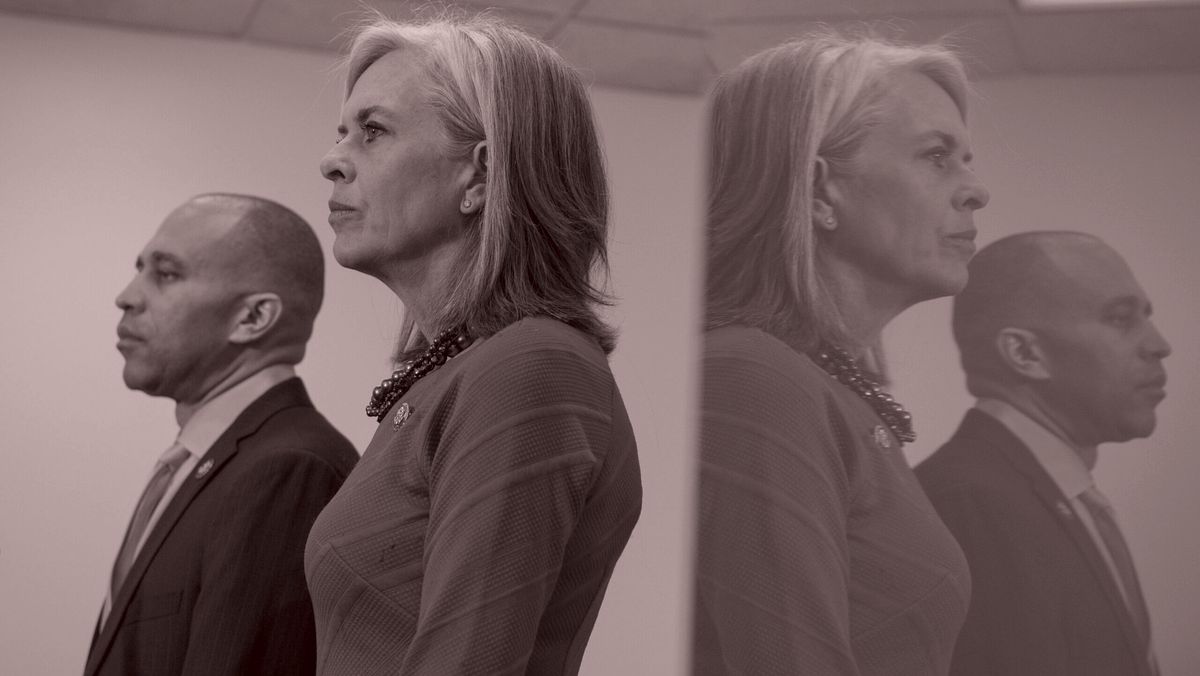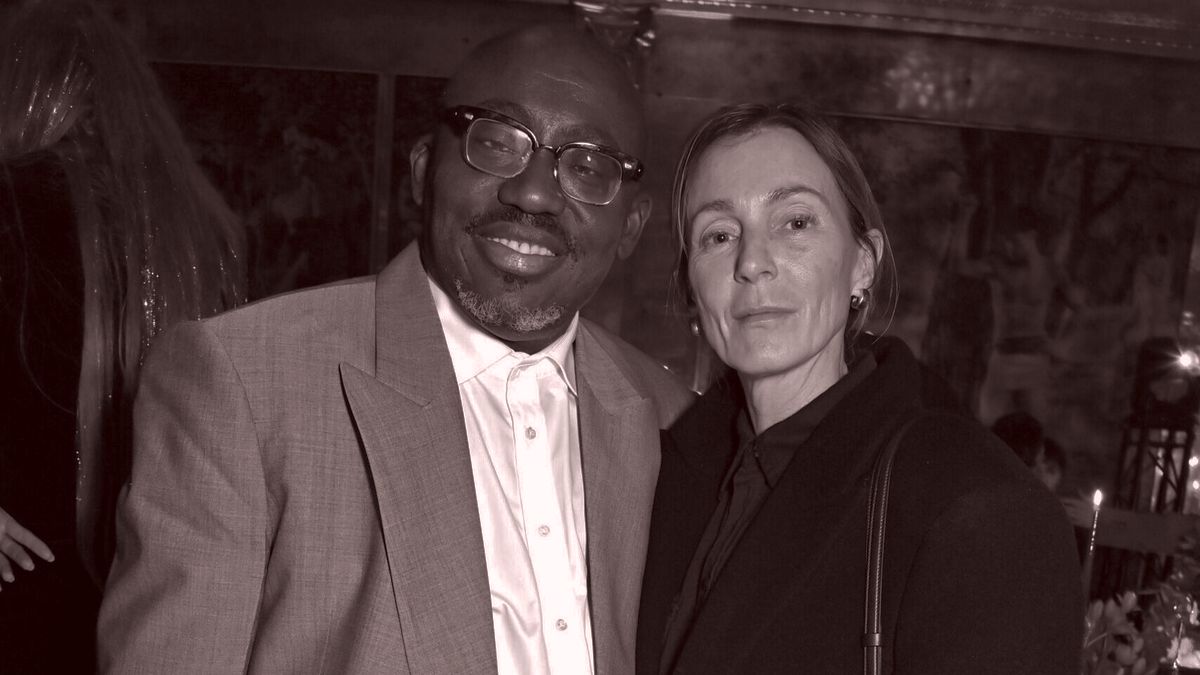Hello and welcome back to The Best & The Brightest. I’m Leigh Ann
Caldwell, here to help you navigate what’s somehow only day eight of Trump’s America.
I crossed another exciting Puck threshold earlier this week when I appeared on my partner Peter Hamby’s excellent podcast, The Powers That Be. We
discussed a number of topics stemming from my dispatch on Sunday night, particularly the bizarre holy war playing out in the House over whether to pass Trump’s agenda through one “big, beautiful bill” or two pieces of legislation. As I noted, this debate isn’t going away.
Trump looms over every decision in town, of course, and that comprises the theme of tonight’s email. John Heilemann has
a candid conversation with former Obama administration and Hillary campaign comms director Jen Palmieri about the Democrats in the wilderness, the broligarchy, the manosphere, and much more. I think you’ll really enjoy it.
But first, some notes on the O.M.B. shocker and other storylines on the Hill…
|
- O.M.G.
over O.M.B.: Before a federal judge in D.C. put a partial stop to the order late Tuesday afternoon, Congress spent the day in major freak-out mode over a directive from the Office of Management and Budget to suspend all federal grant programs—which in theory would have “temporarily” halted $3 trillion in spending and possibly hit every district in the country. The directive set off an avalanche of tearful or terrified calls to Republican and Democratic lawmakers,
alike, from constituents and local nonprofits that rely on government assistance and grants. Senators said (and media reports confirmed) that Medicaid payments were frozen.
Causing even greater confusion earlier today, the White House tried to walk back the freeze in a memo sent to Hill offices, insisting that direct payments to people, including Medicaid payments, were not on hold. (There was just a “portal outage,” per White House press secretary Karoline
Leavitt’s statement on X.) Anyway, the Senate Appropriations Committee went scrambling and asked O.M.B. for more guidance. Later Tuesday afternoon, Judge Loren AliKhan ruled the administration could not, for now, block funds already slated to be disbursed. Another hearing is set for Monday.
In a spreadsheet that O.M.B. sent to agencies late last night that I subsequently
obtained, some 2,625 programs were listed as under review—including a program to prevent veteran suicide, dozens of initiatives linked to cancer research, a State Department office focused on weapons of mass destruction, and a Department of Labor job training program for veterans. Meanwhile, it’s still unclear exactly
what O.M.B. actually intended to freeze. Even if direct payments to individuals would be unaffected, as the White House has declared, much of the money is doled out indirectly to people through nonprofits and services—from school lunches for low-income children to community health clinics.
Regardless of its ultimate fate, the directive is fully in keeping with the new Trump administration’s wildly expansive approach to executive power and sidelining of Congress, and so
far, most congressional Republicans have seemed perfectly happy to assist their own branch’s slide into irrelevance. Indeed, O.M.B. issued the directive before its architect, Russ Vought (previously of Project 2025 fame), had even been confirmed to lead the office. Some Republicans privately think it should hurt his chances of getting confirmed—but they admit that it won’t.
I’ll have more on this tomorrow, so feel free to send tips to Leighann@puck.news
or by replying directly to this email.
- Jeffries vs. Thune: Democrats, for their part, are questioning the legality and constitutionality of halting funds that Congress has appropriated. According to a messaging memo that I obtained, Democratic leadership has directed its members to call press conferences and push out videos on social media, highlighting the people in their districts who would be impacted if the order takes effect. Indeed,
regardless of the order’s legality or what the Constitution says (a phrase I suspect we’ll be using a lot these next four years), the political consequences—not to mention the human ones—could be profound if kids start to go hungry and veterans start to commit suicide in greater numbers. Trump may not be worried about his own reelection, but depending on the courts, lawmakers may soon find themselves caught between their fear of the president and the needs of their
constituents.
Republicans, meanwhile, carried on as if there were nothing unusual about the O.M.B. directive at all. Neither of the Senate’s top two Republicans, majority leader John Thune or whip John Barrasso, addressed the directive in their opening remarks on the floor. When I asked Thune about the freeze, he called it “normal practice at the beginning of an administration.” The courts will decide if the funding freeze is legal, but the size
and scope and breadth of it is definitely not normal.
- Peters out: Meanwhile, Democrats suffered another blow this morning when Michigan Democrat Gary Peters announced he’ll leave the Senate at the end of his term in 2026. Peters, who ran the Senate Democrats’ campaign arm—a time-consuming, jet-setting, donor-schmoozing, constant-calls-from-Chuck–Schumer-taking, brutal
four years—understandably wants to do something new, which will likely involve riding his Harley.
A person close to Peters told me that he doesn’t believe in spending one’s golden years in the Senate, as so many of his colleagues choose to do. He’s still a relatively sprightly 66, and he’s happy with what he’s accomplished; if he served another term, he’d be 74 at its conclusion, which he thinks is too old to serve. The reasoning seems almost quaint by Hill standards.
In any case,
his shock retirement after just two terms puts his swing state squarely back in the mix, likely forcing Democrats to spend significant sums to defend the seat for the second election cycle in a row—albeit in a midterm environment expected to favor Democrats. (Longtime senator Debbie Stabenow retired last year, leaving an open seat that Democrat Elissa Slotkin barely won by 0.3 points.)
The Democratic primary is expected to be crowded. Pete
Buttigieg, who moved to the state two years ago and piqued widespread speculation about his political ambitions, is looking at running. Lt. Governor Garlin Gilchrist II, State Senator Mallory McMorrow, Attorney General Dana Nessel, and Reps. Haley Stevens and Hillary Scholten are also considering, I’m told by a plugged-in Michigander.
- Knives out for R.F.K.
Jr.: Robert F. Kennedy Jr. will face the Senate Finance Committee tomorrow and the Health, Education, Labor and Pensions Committee on Thursday as he seeks confirmation to lead the Department of Health and Human Services. Now comes the glaring part of the scrutiny. As my former colleagues at The Washington Post reported, the nominee’s
cousin, former ambassador Caroline Kennedy (the daughter of the former president, in case you don’t have a copy of the Kennedy family tree at hand), sent a letter to senators calling R.F.K. Jr. a “predator” who only went on an anti-vaccine crusade because he was being paid to do so.
Here’s the disturbing part, which the Post details: “His basement, his garage, his dorm room were the centers of the action where drugs were available, and he enjoyed
showing off how he put baby chickens and mice in the blender to feed his hawks. It was often a perverse scene of despair and violence.” Like I said earlier, the hearings will be fascinating, if nothing else.
|
And now, here’s Heilemann…
|
|
|
As Donald Trump begins to exert his unholy will on D.C., longtime Democratic strategist
Jennifer Palmieri surveys the wreckage, and finds some new leaders emerging.
|
|
|
Almost immediately after Joe Biden left the presidential race last
summer, my longtime pal and former Circus co-host Jennifer Palmieri, then doing a podcast for MSNBC with former senator Claire McCaskill and appearing regularly on the network, took a leave of absence from the commentariat to become the short-term, sprint-to-the-finish-line chief of staff to second gentleman Doug Emhoff. At the time, I texted Doug to congratulate him on the hire and told him it would work out great, as long as he
followed one simple rule: Always do whatever Jen says. To the best of my knowledge, Doug adhered to that rule to the letter—which is one reason, I’d suggest, why he exited the campaign with his public image both elevated and enhanced.
With Jen back in circulation, I asked her to come on my Impolitic podcast to share some pearls of wisdom one week into Trump 2.0. That wisdom, of course, derives from a career in politics during which she has quite
literally seen it all, from working on Capitol Hill for then-congressman Leon Panetta; to a stint in Bill Clinton’s White House (Monica Lewinsky was her intern); and serving as a communications strategist for John Edwards and Hillary Clinton during each of their presidential runs, with a tour in between as Obama’s White House communications director. (She’s also the
author of two books, Dear Madam President: An Open Letter to the Women Who Will Run the World, and She Proclaims: Our Declaration of Independence From a Man’s World.)
In short, there’s no one better suited to make sense of the Democrats’ place in Trump Redux than Jen. In this lightly edited and condensed excerpt from our conversation, we discuss the dizzying first days of Trump’s second term, including the J6 pardons, and which Dems will be effective in confronting him.
She also has some surprising words for Marjorie Taylor Greene. You can listen to our full conversation here.
|
“The
Thing I Had Not Predicted Was the Oligarchs”
|
John Heilemann: Having witnessed the first week of
Donald Trump’s second term, how are you feeling?
Jennifer Palmieri: The thing that I had not predicted was the oligarchs. I found it surprisingly upsetting to see them all stand behind Trump—and then, the back-and-forth between Elon Musk and Sam Altman, being so cavalier and childish with things that are pretty important. In some ways, it’s not as bad to lose this time around,
because you’re thinking, Oh yeah, America does stuff like that, like, America elects Trump every now and then. But what is disturbing is the degradation of people who are going down the drain with him. There are important things that he did that are troubling, obviously, like the J6 pardons, but what concerns me is a degradation of American character, and people buying in because they think it’s good for them.
In his first week in office, the American people saw Trump taking a lot of actions, but there’s no focus in Trumpworld. Do you think that’s a problem for them—indiscriminate executive orders as opposed to focusing on the actual things that got him reelected?
If you’re working for him, or supported him, you think he had a great first week because people are so frustrated with government. So if you’re paying a
little bit of attention, you’re thinking, All right, he did something on the border; it seems like he did some executive orders that maybe were meant to try and deal with the economy; he pardoned a bunch of people; and the stock market went crazy. So, in the short term, they’re happy. But for Democrats, there’s a lot to pick at there: this A.I. deal that nobody really understands; the lawlessness of letting criminals who have beaten up cops out of jail; the threatening of Panama. I
thought the whole point about all of this was about prices? The stuff that’s going to stick, and that people will remember, is the J6 pardons.
When you say you think there’s a price to pay for that, what do you think that price is? Is anybody on the Democratic side doing a good job prosecuting that case?
They wanted to not pardon everyone,
but it got complicated, and he was like, Fuck it, just let them all go. That’s playing into an overall vulnerability of his—being cavalier and not caring about anything but himself. So what I would say is, he let all these criminals out of jail because it’s always, always, always about him. He’s still mad about January 6th, and he did this as retribution. It won’t go away, because pardon [recipients] like Enrique Tarrio are not being quiet and are saying a bunch of
crazy stuff out there.
There are Democrats who are effective about it. I think Jamie Raskin is effective; I think Hakeem Jeffries is effective; I think Senator Adam Schiff is effective. But it has to take hold over a long period of time. Even the F.O.P. [Fraternal Order of Police] had to come out and chastise him. They’re like, Whoa, we didn’t think that was gonna
happen.
|
After the January 6 pardons, a scene played out on the floor of the House with
A.O.C. and Marjorie Taylor Greene, two of the most polarizing, and compelling, members of Congress. What do you think about their messages, their movements, and their futures in their respective parties?
They’re both very effective communicators; A.O.C. is better than Marjorie Taylor Greene. I’ve spent a decent amount of time with Marjorie Taylor Greene, certainly
more than most people who aren’t Republicans. She’s smart; she knows what she’s doing; she’s very astute about power. She knows how to go for the jugular, both in terms of where an opponent is weak, and also what people care about. Then, at some point, she takes this wild turn that makes you go, Whoa, she is not in touch with reality.
It’s hard for me to predict where the Republican Party is
going to go, but Ocasio-Cortez really understands power, she does her homework, and she’s learned how to be effective in Congress. She’s going to be around for a long time.
Who’s saying things that matter, and has some kind of a grip on what Democrats need to be doing?
Within D.C., I think Hakeem
Jeffries and the House Democrats are very disciplined and good at this. There are people who have a specific message, and then there are people who’ve just sort of emerged authentically. Tim Kaine comes to mind; he’s been great. Tammy Duckworth was great at the Hegseth hearing. Elissa Slotkin was excellent. They’re not pussyfooting around.
I’m not going to ask you to handicap it, but who are the people you think are definitely going to be running in 2028?
It’s going to be unbelievable. There’s a lot of talent: Gretchen Whitmer, Gavin Newsom, J.B. Pritzker, Pete Buttigieg, Chris Murphy, Josh Shapiro. Does John Fetterman run? Governor Andy
Beshear of Kentucky. Wes Moore, my governor. Kamala Harris!
|
What do you think of Melania Trump and her $40 million deal with Amazon to
produce a documentary about her, which is being directed by one of the most heinous scumbags of the #MeToo era, Brett Ratner?
It doesn’t surprise me, just because I know what happens to women in the public eye, particularly if they’re not aggressive about being out there and telling their story. I’m interested to know more about her. This $40 million deal—at a time when the industry is going
through hell, and no one has money for political projects—is mind-blowing. It’s mind-blowing that Bezos is like, Yeah, I’m going to pay $40 million. Melania is getting paid twice as much as Billie Eilish for a documentary that I don’t think a lot of people are going to watch.
I want to discuss the Brett Ratner of it all. Trump is interwoven in the
#MeToo movement. How do you tell that story, of how Trump has brought us all along the narrative arc of #MeToo and all it represents?
I think about it well beyond #MeToo. The rise of women leaders is coinciding with the greatest erosion of women’s rights. I think America would, and will, elect a female president. I don’t believe Kamala Harris lost because
she’s a woman. It was harder for her because she was a woman, but there was a man in the race—Joe Biden was in the race, and Kamala Harris did a lot better than him. Hillary got more votes than Trump. I really don’t feel like men are trying to hold women back. It’s certainly not my personal experience. But there’s a lot of cultural change happening, and gender and diversity are a part of that. It’s caused quite a reckoning. You see tech leaders like Mark
Zuckerberg, who, when Trump was in office the first time, said a lot of great stuff about women and diversity; and now that it’s “safe” to be super pro-male, he talks about how we need more masculine energy in the C-suite.
It may take a long time, but I believe in that long arc. And there will be backlash. Trump was a backlash; and #MeToo and the #Resistance were the backlash to the backlash. And Trump
winning again is a part of the backlash, and there will be another backlash. But we won’t stay here. Three years from now, we’re not going to be talking about how we don’t listen to masculine energy enough.
|
|
|
Join Emmy Award-winning journalist Peter Hamby, along with the team of expert journalists at Puck, as they let you in on the
conversations insiders are having across the four corners of power in America: Wall Street, Washington, Silicon Valley, and Hollywood. Presented in partnership with Audacy, new episodes publish daily, Monday through Friday.
|
|
|
Unique and privileged insight into the private conversations taking place inside boardrooms and corner offices up and down Wall Street,
relayed by best-selling author, journalist, and former M&A senior banker William D. Cohan.
|
|
|
Need help? Review our FAQ page or contact us for assistance. For brand partnerships, email ads@puck.news.
You received this email because you signed up to receive emails from Puck, or as part of your Puck account associated with . To stop receiving this newsletter and/or manage all your email preferences,
click here.
|
Puck is published by Heat Media LLC. 107 Greenwich St, New York, NY 10006
|
|
|
|


























